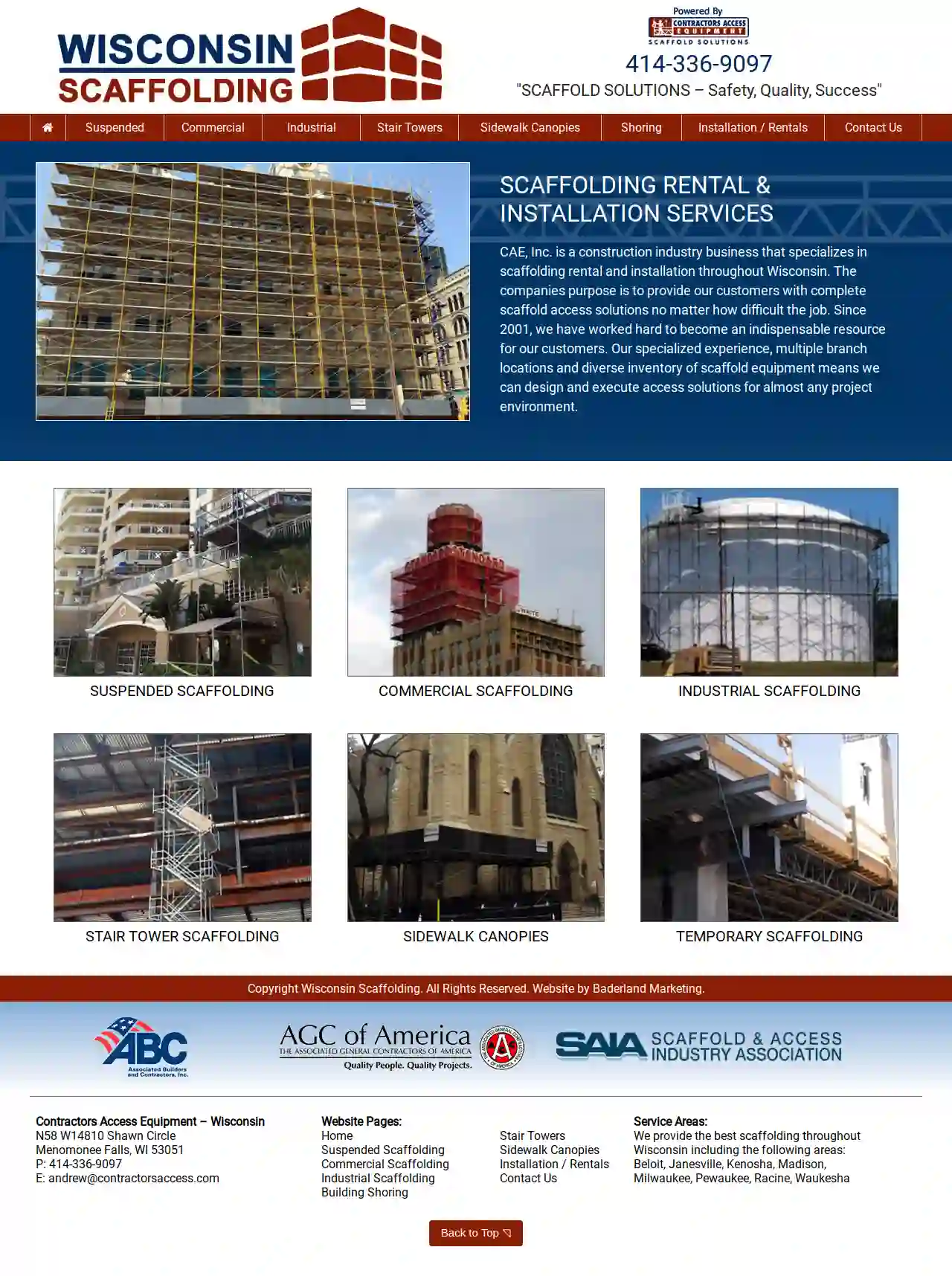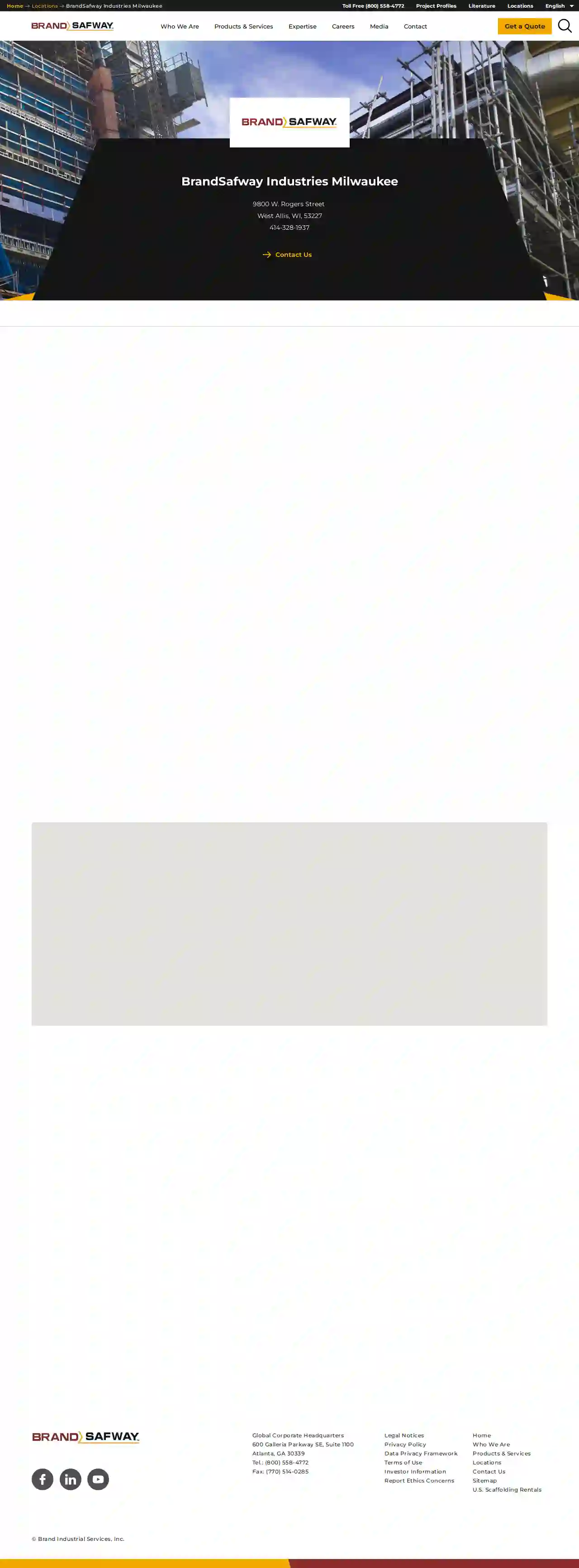Scaffolding Companies Chippewa Falls
Top Scaffold Services in Chippewa Falls
Get 3 FREE Construction Scaffolding quotes for your project today! Compare profiles, reviews, accreditations, portfolio, etc... and choose the best deal.

API Construction
51 reviews2725 S 163rd Street, New Berlin, 53151, USAPi Construction is a trusted scaffold and high-reach equipment expert in Milwaukee, Wisconsin. We provide safe, reliable, and high-quality access equipment, scaffold, accessories, and safety training for contractors. Our commitment to safety is the essence of how we perform our best and safest projects. We believe that zero injuries are achievable and the expectation of our company. We offer a variety of scaffold rental and expert design solutions, including custom-engineered scaffold solutions with erection and dismantle services. Our team of skilled scaffold engineers and designers provides total end-to-end support of your scaffold requirements, no matter the project scope. We are proud to be powered by the APi Group and are ready to serve your projects in Wisconsin and the surrounding area.
- Services
- Why Us?
- Accreditations
- Our Team
- Gallery
Get Quote
Badger Ladder LLC
4.637 reviewsMilwaukee, USBadger Ladder is a trusted supplier of scaffolding for sale, ladders, and pump jacks, with nearly 30 years of industry experience. Our scaffolding products offer customizable heights for easier access to difficult areas, and are built to last. We provide various types of scaffolding, including cross braces, stacking pins, and scaffold planks to meet all your project needs. Our scaffolding for sale online offers the advantages of powder-coat paint, preventing rust, and a cope-welded design for enhanced strength. Designed to meet the demands of any workload, our scaffolding is suitable for both interior and exterior use.
- Services
- Why Us?
- Gallery
Get Quote
Wisconsin Scaffolding
Menomonee Falls, WI, N58 W14810 Shawn Circle, 53051, USContractors Access Equipment, Inc. (CAE) is a construction industry business specializing in scaffolding rental and installation throughout Wisconsin. Since 2001, CAE has worked hard to become an indispensable resource for customers. With specialized experience, multiple branch locations, and a diverse inventory of scaffold equipment, CAE can design and execute access solutions for almost any project environment. CAE provides the best scaffolding throughout Wisconsin, including Beloit, Janesville, Kenosha, Madison, Milwaukee, Pewaukee, Racine, and Waukesha.
- Services
- Why Us?
- Accreditations
- Our Team
- Testimonials
- Gallery
Get Quote
BrandSafway Industries Milwaukee
410 reviews1234 Industrial Drive, Milwaukee, 53203, USBrandSafway is a leading provider of access solutions, including scaffolding, aerial work platforms, and forming and shoring. With a strong commitment to safety, quality, and customer satisfaction, BrandSafway offers a wide range of services tailored to meet the unique needs of clients across various industries. Their team of experienced professionals works closely with clients to understand their requirements and deliver customized solutions that enhance efficiency and productivity. BrandSafway is dedicated to providing innovative access solutions that ensure safe and efficient project execution.
- Services
- Why Us?
- Accreditations
- Our Team
- Testimonials
Get Quote- Br
BrandSafway Industries Wisconsin Rapids
44 reviewsMilwaukee, US- Services
- Why Us?
Get Quote
Over 2,353+ Scaffolding Contractors in our network
Our scaffolding contractors operate in Chippewa Falls & surrounding areas!
ScaffoldingHQ has curated and vetted the Best Scaffolding Businesses in Chippewa Falls. Find a trustworthy contractor today.
Frequently Asked Questions About Scaffolding Companies
- Mobile Elevated Work Platforms (MEWPs): Scissor lifts, boom lifts, and other MEWPs offer flexible access for specific tasks.
- Mast Climbing Work Platforms (MCWPs): Ideal for high-rise construction, providing a stable working platform that can be raised incrementally.
- Suspended Access Equipment: Ropes and harnesses used for specific tasks like window cleaning or façade repairs.
- Ladders and Step Ladders: For shorter durations and limited working heights, provided they are used safely and appropriately.
- Hire Professionals: Just like erection, dismantling should be done by qualified and experienced scaffolding erectors.
- Reverse the Erection Process: The dismantling process should generally follow the reverse order of erection.
- Clear the Area: Ensure the area below is free from people and obstacles.
- Lower Materials Safely: Use ropes or other safe methods to lower dismantled components to the ground.
- Inspect Components: As components are removed, inspect them for damage and store them properly for future use.
- Experience: 'How long have you been in business, and what experience do you have with projects like mine?'
- Licensing and Insurance: 'Are you fully licensed and insured, and can I see proof of coverage?'
- Safety Record: 'What are your safety procedures, and how do you ensure worker safety on the job site?'
- References: 'Can you provide references from previous clients?'
- Quotes and Costs: 'Can you provide a detailed quote that outlines all costs, including materials, labor, and any additional services?'
- Project Timeline: 'What is the estimated timeframe for scaffolding erection and dismantling?'
- Communication: 'How will you communicate with me throughout the project?'
- Project Size and Complexity: The height, configuration, and accessibility of the scaffolding will influence the amount of materials and labor required.
- Scaffolding Type: Different scaffolding systems (tube and clamp, system scaffolding, suspended scaffolding) have varying costs.
- Duration of Rental: The length of time you need the scaffolding will affect the overall rental price.
- Location: Labor costs and material availability can differ based on your location.
- Additional Services: Some companies may offer additional services like erection, dismantling, or transportation, which can add to the cost.
What are some alternatives to traditional scaffolding?
How do I dismantle scaffolding safely?
What questions should I ask a scaffolding company before hiring them?
How much does scaffolding cost to hire in the USA?
What are some alternatives to traditional scaffolding?
- Mobile Elevated Work Platforms (MEWPs): Scissor lifts, boom lifts, and other MEWPs offer flexible access for specific tasks.
- Mast Climbing Work Platforms (MCWPs): Ideal for high-rise construction, providing a stable working platform that can be raised incrementally.
- Suspended Access Equipment: Ropes and harnesses used for specific tasks like window cleaning or façade repairs.
- Ladders and Step Ladders: For shorter durations and limited working heights, provided they are used safely and appropriately.
How do I dismantle scaffolding safely?
- Hire Professionals: Just like erection, dismantling should be done by qualified and experienced scaffolding erectors.
- Reverse the Erection Process: The dismantling process should generally follow the reverse order of erection.
- Clear the Area: Ensure the area below is free from people and obstacles.
- Lower Materials Safely: Use ropes or other safe methods to lower dismantled components to the ground.
- Inspect Components: As components are removed, inspect them for damage and store them properly for future use.
What questions should I ask a scaffolding company before hiring them?
- Experience: 'How long have you been in business, and what experience do you have with projects like mine?'
- Licensing and Insurance: 'Are you fully licensed and insured, and can I see proof of coverage?'
- Safety Record: 'What are your safety procedures, and how do you ensure worker safety on the job site?'
- References: 'Can you provide references from previous clients?'
- Quotes and Costs: 'Can you provide a detailed quote that outlines all costs, including materials, labor, and any additional services?'
- Project Timeline: 'What is the estimated timeframe for scaffolding erection and dismantling?'
- Communication: 'How will you communicate with me throughout the project?'
How much does scaffolding cost to rent in the USA?
- Project Size and Complexity: The height, configuration, and accessibility of the scaffolding will influence the amount of materials and labor required.
- Scaffolding Type: Different scaffolding systems (tube and clamp, system scaffolding, suspended scaffolding) have varying costs.
- Duration of Rental: The length of time you need the scaffolding will affect the overall rental price.
- Location: Labor costs and material availability can differ based on your location.
- Additional Services: Some companies may offer additional services like erection, dismantling, or transportation, which can add to the cost.